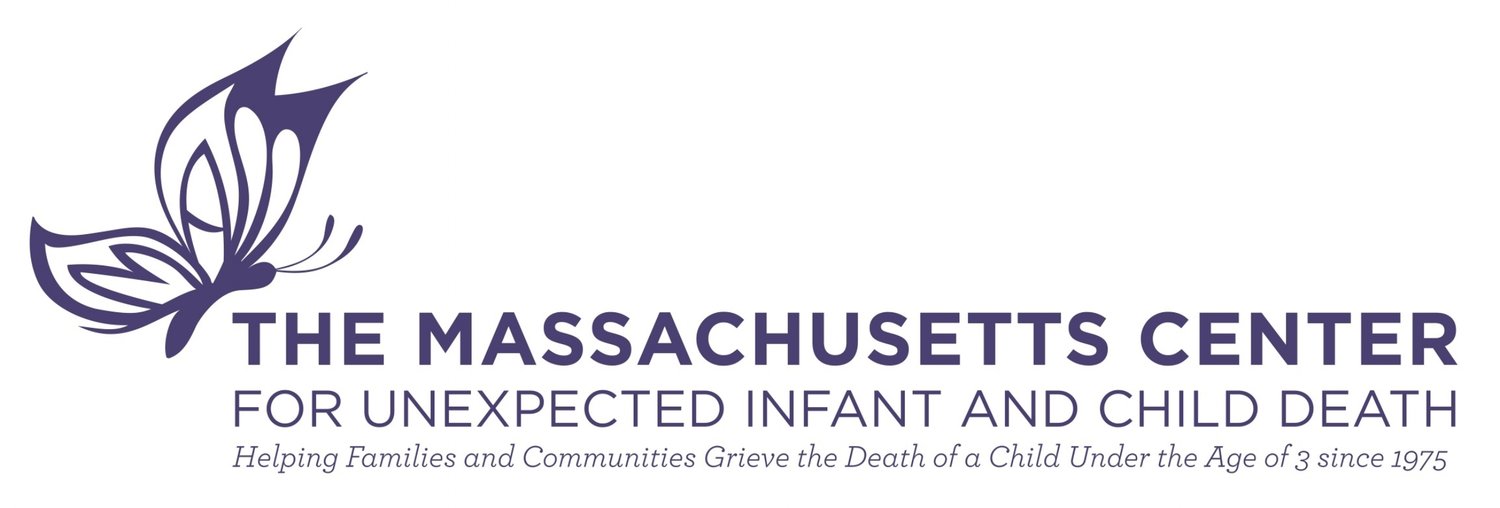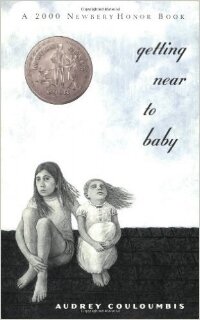“When a child dies, you bury the child in your heart.”
Explaining Death to Children
Some of the ideas children have about death come from television or movies, where people get hurt but magically reappear. Children, especially the very young, easily believe in magical endings. They also believe in magical causes of death. They may think something they said or thought or did caused the baby to die. They may have had mixed feelings about this new baby. Even adults will question everything they did or thought during the pregnancy, trying to find a reason why. Usually, adults can tell themselves they know these things didn’t really cause the baby to die. But children can’t do this.
Some of your children’s ideas about death might come from words they hear adults use. Explaining that the baby “went to sleep and didn’t wake up,” or that the baby “was taken to heaven to be an angel,” might make children afraid that this could also happen to them. Using words like the baby “went bye-bye” or was “lost” might make the child think the baby would be coming back, or would be found.
A grandmother told her grandson:
"When you die, your body stops working. You cannot see, or hear, or think, or feel anything. It can’t be fixed. It is forever. You can’t die and then come alive again. So it is very different than being asleep.”
When you talk with your children for the first time about the baby’s death, you may only need to say a little. Don’t over-explain. You can tell if they’ve heard enough by their behavior.
Begin by saying that the baby has died. You may need to explain this to young children. Tell them as much as you can about why this happened in simple words they can understand.
Talking a little about how you and other people might act about the baby’s death helps your child understand grief. Children often want to protect their grieving parents. To spare them any pain, they will not talk about their own sad or scary thoughts. Sometimes they do this because other adults have told them to “be a little man” or not to bother their parents during this time of sorrow.
How one grieving mother explained the death to her preschooler:
“I want you to know that I am sad because the baby died. When people feel this sad, it helps them to cry. I wish the baby didn’t die, and because I can’t do anything about that, it makes me feel angry, too. But I am not angry or sad because of anything you did. I know I will feel better, but it will just take some time.”
Your child may also feel the baby is a forbidden subject if you do not talk to him about what is happening. By mentioning some of your own feelings, you make it safe for them to talk about what they’re thinking too. You can let your child know that you are very sad about the baby and that you will need a little time to feel better. This lets them know they are not alone with their emotions. You can tell your child that even though grieving is very hard, it is also a natural healing process. Although you are the best judge of your children’s needs, you may need some extra help right now. You can ask a relative or close friend to be available to your child during this time.
If possible, talk to each child separately. Ask them a few questions to learn what ideas they already have about death. When you think they are understanding what death means, you may choose to add any personal beliefs about what happens after death.
It is important to consider the developmental level of your child when explaining the death to him/her. Below are guidelines to help you understand where to begin.
Ages 2-6
Very young children may be more fussy or clingy, have changes in their eating or sleeping habits, and may fear going to sleep at night. At this age, they respond best to lots of physical comforting from you or another adult they know well.
Children are able to understand words before they can speak them well. So simple explanations can be given to preschoolers. They are least likely to understand death and may think it’s temporary or reversible – that the baby will be coming back. They may also worry about the baby being buried.
Very young children often believe that their wishes or thoughts could have caused the baby to die. They may now remember all the times they felt selfish or jealous of the baby. Other events adults would not connect with the death make perfect sense to them. Having been told to always dress warmly before going outside, for example, they may think their mother forgot to do this and the baby got sick. The power of this “magical thinking” makes it important to use clear, simple explanations.
A real fear for children this age is that they might die, too, or that their parents will. You might want to reassure them that sometimes a baby stops growing before it is ready to be born. Or, that sometimes little babies’ bodies stop working. But that this is not going to happen to them, or to you. You may find yourself answering the same questions about the baby’s death several times. Preschoolers learn by repeating things over and over again.
Ages 6-9
School-age children usually understand that death is forever, so it may be more frightening for them. They may wish to avoid places or things they associate with someone who has died, such as the baby’s room. Death may seem like an enemy that they can try to avoid or beat.
Children of this age may still develop theories that are not based on fact about why the baby died. And because conscience develops at this age, they may feel responsible. Your children are also better able to sympathize with you, now. But because they are so young, they may misjudge what they think you need They may not talk about the baby or their own feelings for fear it would make you sad. This protective burden can feel overwhelming to a young child.
Ages 10-12
Some false ideas about why death happens, and feelings of responsibility, still linger in this age range. Older children may reflect more on how death of the baby will affect the family as well as them personally. They may have strong ideas about memorial rituals for the baby. These children may be critical of the way family and friends react to your baby’s death. However, they can also be very sensitive to others’ needs.
Teens
Your teenager will most likely be capable of an adult understanding of death. But because they are very new to adult behavior, they may be unsure of how to respond to the death of the baby. Adolescents may also be more interested in the biological details of the baby’s death and may have very strong feelings about the unfairness of death. It is normal for children to grow apart from you at this age. They may not have peers who have experienced this type of grief. It would be most helpful if someone listened to them rather than offered solutions.
Age Makes a Difference
When Children Grieve
Routines can provide a sense of safety and stability to children. Many adults are amazed to see children go back to normal activities so soon. Children are not able to grieve for long periods of time and need frequent breaks from their sadness. It does not mean they are uncaring.
Play is the way many children work out their feelings. Sports and other physical activities are good ways to release intense feelings. Younger children may act out their feelings in imaginary play. You can learn what they are thinking by watching this play, or by playing with them.
Drawing, keeping a journal, writing stories, poems, or a letter to the baby are other ways children may express themselves. Older children may like to perform or listen to music. Many books about grieving are available for children of different ages. Whatever your child enjoyed doing before the baby died should be encouraged now.
Your child may not say much at all about the baby. You will probably learn more about how your child is feeling by noticing any changes in behavior. It may be difficult for them to be around pregnant women or babies for a while. Frequently, children will demand more attention. They may be disobedient or disagreeable. This happens more often with preschool and school-age children. Continue to keep the usual limits you set for their behavior.
A teen wrote this to his mother:
“I went to buy you a card today. It was a birthday card for the baby you didn’t get to bring home. We talked a lot about my sister, but that was a long time ago. I was worried that if I sent you this card, it would make you sad again. But I think I know how you will feel. You will be glad because I remember her, too.”
Less often, children may have nightmares, lose their appetite, or have other physical problems. Usually, their behavior changes will right themselves over time.
As children grow up, they will think about the baby in new ways. They will also know more words to ask for the information they want. They may continue to bring up the subject of the baby from time to time, asking questions that you thought you had already handled. It is just a sign that they are growing in experience and understanding.
Growing Up with a Loss

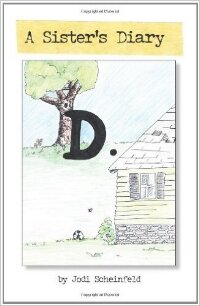
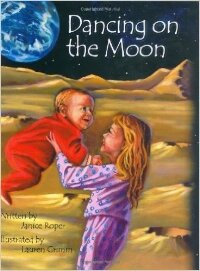
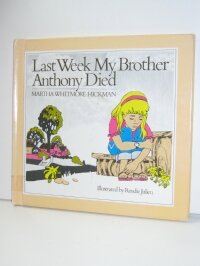


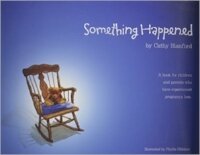
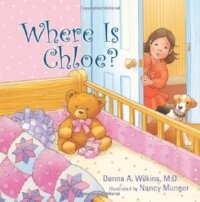
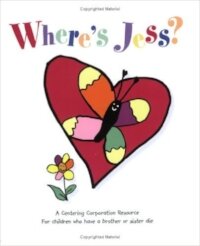
Reading together often encourages conversation. Click through the gallery on this page to see a variety of books for children.
As your child reaches new developmental levels, their grief may resurface. This is okay and is an opportunity to show your continued support.
It is important to remember, though, that childhood grief reactions will manifest differently in all children. It is not unusual to notice physical complaints, such as stomach-aches, or witness changes in sleeping and eating patterns. Particular grief behaviors and emotions may come and go, sometimes suddenly or frequently. This is expected. Your child may revert to old behaviors; this is okay.
Very young children who are not yet verbal may notice the absence of their sibling and the changes in family dynamics, and will react in various ways.
Children often use play as a way to process what they are feeling.
Navigating a child's grief can be an incredible challenge, as their understanding of death, physical and emotional reactions and coping strategies within the different developmental levels vary by their age. Most important to remember is that all children grieve differently. There is no right or wrong way to grieve, nor set stages a child will pass through.
Ways Parents Can Help Bereaved Children
A. Recognize your own feelings. Think about your own experiences with loss, separation and death. They may well have an impact on your comfort in helping children and adolescents with their grief.
B. Share the fact of the death. Provide age-appropriate information about what happened and what rituals will occur. Explain how the person’s body is no longer working— not breathing, eating, going to the bathroom etc.
C. Be aware of issues that make a specific child vulnerable. These include things such as many recent losses, knowing someone with the same illness, being the best friend or worst enemy of the person who died or having had some actual responsibility for the death. Consider a referral to a mental health center or professional for preventative services.
D. Address the children’s fears and fantasies. Be particularly aware of those that grow out of magical thinking and reflect an inappropriate sense of responsibility for the death.
E. Discuss issues specific to the situation. Every death is unique and raises specific issues. Children may want to talk about an illness, violence or suicide, alcohol and drug use or troubled adults who hurt children. They may want to know about wakes and funerals, cremation and burial or ethnic and cultural diversity in death rituals.
F. Support children and adolescents as they grieve. Provide an environment where grieving is accepted. Talk specifically about the appropriateness of sadness and anger. Share your own grief with your children, being sure they know they have not caused tears or anger.
G. Remember the person who died and help children and adolescents participate in that commemoration. Young people can often make suggestions about the content of a funeral or memorial service, flowers, or what to do with particular belongings of the person who died. Commemorative activities may go on over a period of time.
H. Use teachable moments to help children and adolescents learn about death and dying. Daily activities and dramatic life events provide many opportunities to talk about death, dying, grief and loss. For example, a dead bird on the side of the road can open discussion about what death is and feelings when something or someone dies. New programs sometimes feature tragic stories on death. Children may raise questions for which we have no answers. It is perfectly acceptable to say that their questions are good ones and we wish we knew the answer, too.
Adapted from: The Garden: A Center for Grieving Children and Teens. Northampton, MA
Additional Support For Children
The Sesame Street website has a section that supports grieving children and families. The website includes developmentally appropriate tips, videos, children's stories, and a guide to help your family communicate with one another, express emotions, and begin the process of moving forward.
For websites that may be helpful for your children, please click here.
For books that may be helpful for your children, please click here.
Additional helpful websites can be found here.
The Good Grief Program at Boston Medical Center may also be able to help you to support your child after they've suffered a significant loss
Charlie’s Guys is an organization that provides support to grieving siblings. These supports include grief therapy stipends, care packages, a pen pal system and more. Charlie’s Guys aims to show children who have lost a sibling that they are loved and not forgotten.
For more information on how to help children in their grief, please click here.
